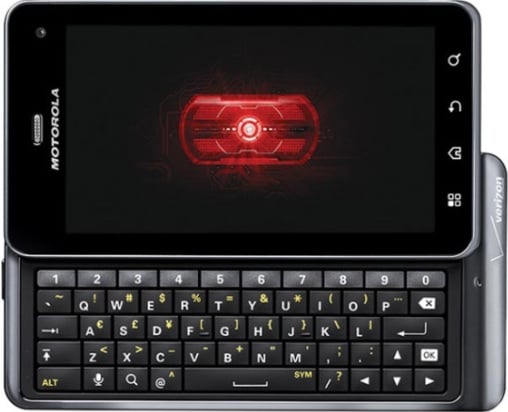Droid 3 Reportedly EOL'd; Situation Highlights Poor Carrier Behavior
We've discussed the fragmentation of Android and the shoddy update services of the various carriers before, but the Droid 3's situation is raising these issues again. According to pre-CES reports, Verizon is poised to end-of-life (EOL) the Droid 3 along with its entire current lineup of MiFi hotspots. The BlackBerry Curve 3G and Palm Pre 2 are also reportedly on the chopping block, but the former is low-end device that's several years old, while the latter is a bit of an anachronism.
The Droid 3, in contrast, is barely six months old. It's the only Motorola phone with a physical keyboard that Verizon carries, and it's already become a poster child for the problems with the Android ecosystem. The Droid 3 runs Android 2.3.4 while the Razr, released last month, runs Android 2.3.5.

Droid...doesn't do much very well.
That single digit has proven to make a significant difference; the Droid 3's performance in tests like SunSpider is as low as half that of the Razr, despite a mere 20 percent clock speed difference. It's possible that this is due to enhancements Motorola made to its own browser as well as to the influence of Gingerbread 2.3.5, but Motorola hasn't specified the situation one way or the other. The company has already stated that the Razr and Bionic will receive an update to Ice Cream Sandwich, but made no mention of the Droid 3.
The problem here goes deeper than the fact that Droid 3 customers are getting a bum deal. The two-year upgrade cycle is fundamentally misaligned with the rapid-fire release of Android devices, and carriers have no reason to perform due diligence when it comes to releasing software updates or ensuring that bugs actually get fixed. This trend effectively destroys what's supposed to be a major benefit of the Android ecosystem--the idea that OS updates and bug fixes are widely available and that users aren't locked in to what a single provider (Apple) says they can or can't do with their products.
In the traditional PC industry, software performance improvements have generally been distributed according to President Kennedy's assertion that "a rising tide lifts all boats." When Microsoft releases an OS Service Pack that improves performance or when a major software manufacturer updates a product with better multi-threading or improved support for SSE, those benefits are available to everyone. Not so in mobile phones.

Early last month, Sony Ericcson and Motorola released statements explaining why it took so long for them to validate ICS and push it out to already-launched devices. Even if we accept their arguments and 5-6 month timeline, it's one thing to say "We'll be updating all of our phones released within the past six months, but it'll take awhile," and another to simply avoid the topic.
The Droid 3, in contrast, is barely six months old. It's the only Motorola phone with a physical keyboard that Verizon carries, and it's already become a poster child for the problems with the Android ecosystem. The Droid 3 runs Android 2.3.4 while the Razr, released last month, runs Android 2.3.5.

Droid...doesn't do much very well.
That single digit has proven to make a significant difference; the Droid 3's performance in tests like SunSpider is as low as half that of the Razr, despite a mere 20 percent clock speed difference. It's possible that this is due to enhancements Motorola made to its own browser as well as to the influence of Gingerbread 2.3.5, but Motorola hasn't specified the situation one way or the other. The company has already stated that the Razr and Bionic will receive an update to Ice Cream Sandwich, but made no mention of the Droid 3.
The problem here goes deeper than the fact that Droid 3 customers are getting a bum deal. The two-year upgrade cycle is fundamentally misaligned with the rapid-fire release of Android devices, and carriers have no reason to perform due diligence when it comes to releasing software updates or ensuring that bugs actually get fixed. This trend effectively destroys what's supposed to be a major benefit of the Android ecosystem--the idea that OS updates and bug fixes are widely available and that users aren't locked in to what a single provider (Apple) says they can or can't do with their products.
In the traditional PC industry, software performance improvements have generally been distributed according to President Kennedy's assertion that "a rising tide lifts all boats." When Microsoft releases an OS Service Pack that improves performance or when a major software manufacturer updates a product with better multi-threading or improved support for SSE, those benefits are available to everyone. Not so in mobile phones.

Early last month, Sony Ericcson and Motorola released statements explaining why it took so long for them to validate ICS and push it out to already-launched devices. Even if we accept their arguments and 5-6 month timeline, it's one thing to say "We'll be updating all of our phones released within the past six months, but it'll take awhile," and another to simply avoid the topic.

